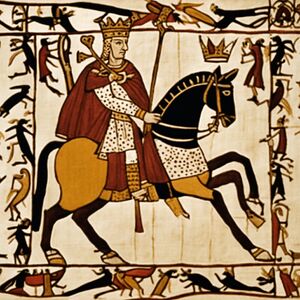Prokopis the Stabiliser
This article is incomplete because it is pending further input from participants, or it is a work-in-progress by one author. Please comment on this article's talk page to share your input, comments and questions. Note: To contribute to this article, you may need to seek help from the author(s) of this page. |
| Prokopis I | |
|---|---|
| King of the Saxenders | |
 Prokopis the Stabiliser mounted on his horse to siege the capital of Saxendia and seize the throne from Vassilis the Insufferable, depicted in the Tapestry of Kings | |
| King of the Saxenders | |
| Reign | c. 2837 – 2812 BL |
| Predecessor | Vassilis the Insufferable |
| Successor | Pericles the Conquerer |
| Born | c. 2865 BL Constanapolis |
| Died | c. 2812 BL Constanapolis |
| Burial | |
| Spouse | Magda |
| Issue | Pericles the Conquerer |
| Dynasty | Prokopisian |
| Father | Florentios |
| Mother | Vassia |
| Religion | Saxendish Paganism |
| Part of a series on |
| the Saxenders |
|---|
 |
Prokopis the Stabiliser (reconstructed Middle Saxender: Προκόπη, meaning "progress"; c. 2865-2812 BL) was king of the Saxenders from 2837 to his death in 2812. He was the first cousin of King Vassilis the Insufferable, whom Prokopis overthrew and had beheaded. Modern historians regard him as "one of the great Saxender kings". He was succeeded by his son Pericles the Conquerer.
Prokopis aimed to centralize the government, increasing control over the production of charters and summoning various new leaders. Various legal texts from his reign indicate that he was extremely concerned with providing amenities for the people as well, and his reign is often chronicled as the Golden Age of Saxendia, especially compared to the disastrous reign of his predecessor, Vassilis. Various historians, however, see the chaos that ensued following his death as having been caused by the over-centralization of government.